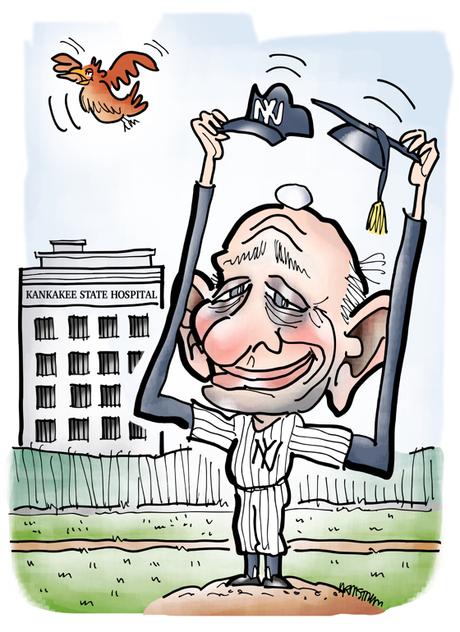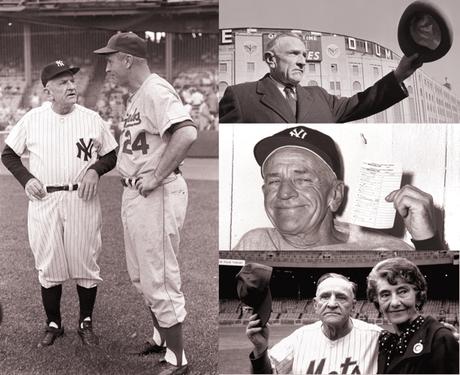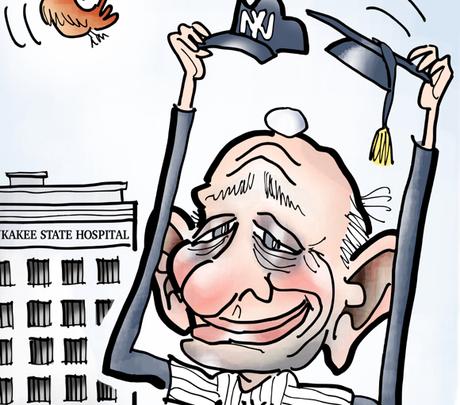You’ve never heard of Casey Stengel?? Ah– you must be a young person: someone under the age of 50!
Casey was one of major league baseball’s true eccentrics. He died back in 1975, but he still inspires, and his legend lives on. I was reminded of this when I read a wonderful review of Marty Appel’s new biography: Casey Stengel: Baseball’s Greatest Character. The review was written by Leigh Montville. It appeared in The Wall Street Journal Weekend Edition. The review was titled: The Lunatic Wore Pinstripes.
I’ve heard many Stengel anecdotes over the years– including the one about him doffing his cap at the plate one day and having a bird fly out (for the record: a sparrow). Mr. Montville began his review with one that was new to me. It made me roar with laughter.

His first professional game was with the Kankakee Kays, a minor league team in
the Northern Association. Their ballpark was across the street from the 119-acre Kankakee State Hospital, formerly known as the Illinois Eastern Hospital for the Insane. The residents would watch the games from their windows, and the spectators could watch the residents watch. Sensibilities being a bit different 107 years ago, the team on the field was soon known in the newspapers and through word of mouth as the Lunatics.
Stengel, 19 years old, a quirky kid from the start, was the Lunatic center-fielder
and the cleanup hitter in the Lunatic lineup. The fit seemed perfect.
“Stengel is one fellow who won’t be here next year,” a teammate, Joe Gilligan, predicted after the team won its first game, 7-6, with a nine-hit sixth inning. Someone asked: He’ll be in the big leagues?
“No, he’s going into that building over there,” Gilligan responded, pointing at the hospital.
“It’s only a matter of time,” more than one teammate added.
I was inspired to draw the following caricature. Why the mortarboard? In later years, he picked up the nickname “The Ol’ Perfessor,” due to his vast store of baseball “wisdom,” colorfully expressed.







1. “When you are younger you get blamed for crimes you never committed. And when you’re older you begin to get credit for virtues you never possessed. It evens itself out.”
Lesson: Every young brand has detractors, some criticism is undeserved. Persevere. Stay positive. Serve. Over-deliver. You’ll create a halo effect.


2. Mr. Montville: “His big ears, his craggy face, his creaking movements, combined with his roundabout, double-talk explanations of anything and everything, made him a public-relations wonder. He liked to talk. People liked to listen, even if they sometimes couldn’t understand.”
Lesson: We like people who make us laugh. We like people who make us feel good. When we like people, we forgive minor flaws and give them the benefit of the doubt.


3. Casey once said that Babe Ruth could have used “a rolled-up copy of the Police Gazette” to hit home runs.
Lesson: Training is good. Experience is good. Webinars are good. TED talks are good. But nothing beats talent. Hire good people, put ’em in the lineup.


4. “I’ll never make the mistake of being 70 again.”– Casey, after being fired by the Yankees for being too old after they lost the 1960 World Series to the Pittsburgh Pirates in seven games.
Lesson: There will come a time when you need to reinvent yourself. Accept this with good humor. Then reinvent yourself and get back in the game.


5. Mr. Montville: “Perhaps (as Mets manager) he fell asleep on the bench sometimes, maybe a lot of times, but he awakened for the press conferences that somehow made the team lovable despite a 40-120 won-lost record in its first season (1962).”
Lesson: Sometimes you lose. Maybe a lot. Go to the press conference anyway: i.e., stay upbeat and engage your fans. Being lovable builds loyalty. The Mets won the 1969 World Series.


6. “The secret of managing is to keep the five guys that hate you away from the guys who are undecided.”
Lesson: No brand bats 1.000. Respond to complaints. Have a social media crisis management plan. Everyone’s watching, including those undecided about your brand.


7. “The trouble is not that players have sex the night before a game, it’s that they stay out all night looking for it.”
Lesson: Employees “stay out” when they’re not fully invested in a brand. They buy in when the corporate culture gives them a chance to lead, to fail, to make a difference.


8. “Most people at my age are dead.”
Lesson: Be glad you’re alive. You’ve got a product or service you believe in. Win or lose, you’re in the game, with a chance to drive in the winning run. It’s a great feeling.


Play ball!!





